5 ways flexible logistics can boost your business efficiency
In an ever-evolving market, the ability to adapt quickly and efficiently to changes is crucial for business success. Flexible logistics is a key component in achieving this adaptability, offering companies the agility needed to respond to varying demands and market conditions. GHOST GROUP OÜ understands the importance of flexible logistics solutions and how they can significantly enhance business efficiency for manufacturers, wholesalers, and retailers.
1. Scalability to Meet Market Demands
Businesses often face seasonal peaks and troughs in demand. Flexible logistics allows for the scaling up or down of transportation and storage resources to align with these fluctuations, ensuring that businesses are not caught off-guard by sudden changes in demand.
Staying ahead of market trends is essential for maintaining a competitive edge. Flexible logistics systems enable businesses to quickly adjust their supply chain strategies to capitalize on new opportunities, ensuring they remain relevant and proactive in their market.
2. Enhanced Speed and Responsiveness
Today's customers expect rapid service and delivery. A flexible logistics partner like GHOST GROUP OÜ can provide swift adjustments to logistics operations, ensuring that customer needs are met promptly and efficiently.
Minimizing downtime is critical for maintaining productivity. Flexible logistics solutions facilitate faster turnaround times for shipping and receiving goods, which in turn reduces idle time and increases overall operational efficiency.
3. Cost Savings Through Optimized Resources
Efficient logistics operations aim to minimize waste, whether it's time, space, or materials. By leveraging flexible logistics, businesses can optimize their resource use, leading to significant cost savings and a leaner supply chain.
Maximizing the efficiency of each load transported is another way flexible logistics can reduce costs. By adjusting to the optimal transport modes and load configurations, businesses can ensure that they are moving goods in the most cost-effective manner possible.
4. Improved Risk Management
Supply chain disruptions can have a major impact on business operations. A flexible logistics strategy allows for quick pivoting and adaptation to unforeseen events, minimizing potential losses and maintaining continuity of service.
Flexibility in logistics contributes to building a more resilient supply chain that can withstand various challenges. This resilience is crucial for businesses to thrive in a dynamic global market.
5. Strengthened Customer Satisfaction and Loyalty
By ensuring that products are delivered on time and in good condition, flexible logistics plays a vital role in meeting customer expectations. This reliability can lead to increased customer satisfaction and loyalty, which are essential for long-term business success.
Offering flexible and efficient logistics solutions can set a business apart from its competitors. By providing superior service, companies can create a unique value proposition that attracts and retains customers.






Comments (0)